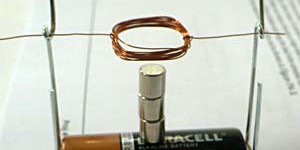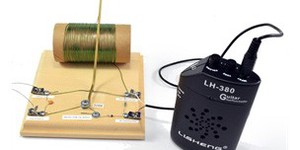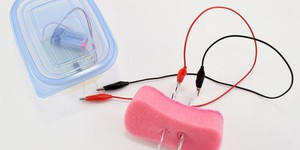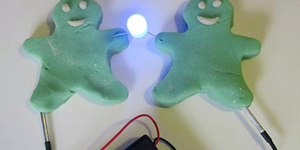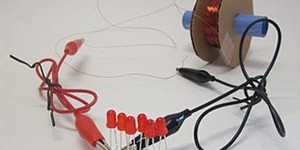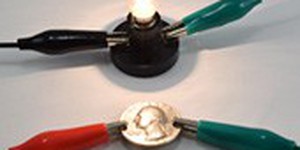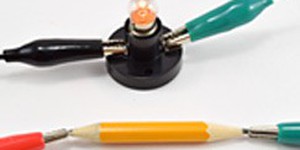Elementary School, Electricity & Electronics Science Projects (26 results)
Stop for a minute and try to imagine your world without electrical power and electronic gadgets.
No convenient appliances in the kitchen, no electric lights. No computers, MP3 players, television, or video games.
Your life would be completely different, wouldn't it? Electricity and electronics are so central to modern life that, paradoxically, they're easy to overlook.
|
Select a resource
Sort by
|
When you think of a motor, you may immediately think of a car, but you actually encounter other motors in your home every day. That's right, if you put on clean clothes from the washing machine, ate food from the fridge, or used a fan, you used an electric motor. In this electronics science project, you will make a simple electric motor with two magnets that "talk" to each other. As they interact, they will alternate between "liking" each other (pulling together), and "disliking" each other…
Read more
Featured
Have you heard that garlic powder is supposed to inhibit the growth of bacteria? Which do you think would make a better disinfectant: a solution of garlic powder or a solution of bleach? This project shows you a straightforward way to compare the effectiveness of different disinfectants (or other antimicrobial agents), by measuring zones of inhibition on a culture plate.
Read more
You may be familiar with permanent magnets—the kind that hang on a refrigerator. But did you know that other magnets, called electromagnets, can be turned on and off? When turned on, electromagnets act just like permanent magnets, but if you turn them off, their magnetic properties disappear. Electromagnets are an important part of many electronic devices, like motors, loudspeakers, and hard drives. You can create an electromagnet with a simple coil of wire and a battery. In this project,…
Read more
New
Have you ever noticed that on a hot day, it's more comfortable to wear a light-colored shirt than a dark one? Or that it's cooler in a park than walking down a street? This happens because different surfaces absorb and reflect heat in different ways. Urban heat islands are parts of cities where man-made surfaces like pavement and buildings replace natural surfaces like grass and trees. In this project, you will use temperature and satellite data to see if certain areas in a city have higher…
Read more
Have you ever wondered how a radio can grab signals that are transmitted through the air and convert them into sound? In this science project, you will build your own AM radio receiver from scratch and use it to listen to AM radio broadcasts. With your crystal radio you will be able to experiment with the circuit and the antenna to get the best reception.
Read more
Water is a valuable resource, and water shortages are a serious problem in many parts of the world. The problem can be made worse by people who waste water; for example, by watering a garden or using sprinklers on their lawn (or a farmer taking care of an entire field) when it has rained recently or the soil is already moist. How can you help conserve water and prevent such waste? One way is to build an electronic soil moisture sensor. This project will show you how to build a circuit that…
Read more
Do you like playing with play dough; or modeling clay? Wouldn't it be cool if you could add lights, sound, or even motion to your play dough creations? In this project, you will use play dough that conducts electricity, which will allow you to connect lights to your sculptures!
This project is the first in a three-part series on play dough circuits, which can all be done with the same materials. We recommend doing the projects in order.
Read more
New
Remembering to take medicine at the right time can be hard, especially if you need to take multiple medications at different times of day. It might not be a big deal if you forget to take your daily multivitamin, but for some people, forgetting to take medication at the right time can be dangerous. What if you had a device that could not only set off an alarm at the right time, but also automatically dispense the right pills for you? In this project, you will build an automatic medicine…
Read more
You have probably read all about forms of alternative energy like solar and wind power. But what about human power? With the aid of a coil of wire and some magnets, you can generate electricity with nothing more than a flick of your wrist. In this project, you will build a small hand-powered electrical generator that can power a series of tiny lights. Get ready to save the planet and get some exercise at the same time!
Read more
When your parents were kids, they probably wore polyester. Static cling was a major household issue! Now everybody wears cotton, which does not get static cling nearly as much. Why are some materials more susceptible to static cling than others? Investigate how well different materials produce static electricity by making a homemade electroscope and testing it out in this science project.
Read more
Electricity powers many of the devices we use every day, from lights to video games and computers. Engineers have to use certain materials to make electrical devices work. In this experiment, you will find out which materials let electricity flow through them (conductors) and which ones prevent electricity from flowing through them (insulators).
Read more
"Paper circuits" are a fun way to mix electronics and art by adding lights directly to a painting or drawing. These lights need a battery to power them, and typically you would use wires to connect them. In paper circuits, though, many materials can be substituted as "wire," including special types of paint, ink, and even aluminum foil. There are also different options for what type of battery you can use. Which materials do you think will work best? Try this project to find out!
Read more
What do you do with your old wooden pencils when they get too short to hold? Don't throw them away; you can use them to make circuits! This project will show you how to use pencils to make resistors, an important part of many electrical circuits, and test how they affect the brightness of a lightbulb in a simple circuit.
Read more
|
Explore Our Science Videos
Make a Model to Explore the Distance from the Planets to the Sun
Popsicle Stick Paddle Boat
Squishy Circuits Classroom Activity Part 1


